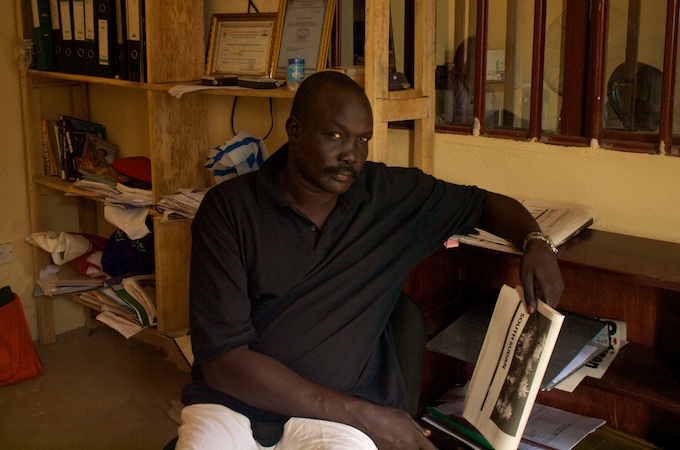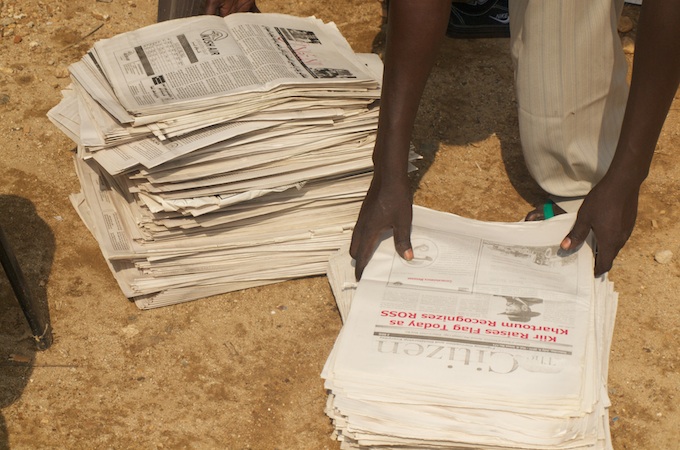South Sudan journalists facing intimidation
Security forces impose their own rules on local reporters in the absence of any media laws.

 Bol has been arrested three times over the last five years by the government in Juba [Gregg Carlstrom/Al Jazeera]
Bol has been arrested three times over the last five years by the government in Juba [Gregg Carlstrom/Al Jazeera]Juba, South Sudan — The newly formed government in Juba, South Sudan, has promised its citizens a vibrant democracy; ask Nhial Bol, and he will tell you it is something closer to a dictatorship.
Bol is the editor of The Citizen, the largest newspaper in South Sudan, which opened its offices in Juba in 2006. Its motto is “Fighting corruption and dictatorship,” a slogan painted on the delivery trucks parked outside its warehouse-like offices on the outskirts of Juba.
The young paper seems to have already lived up to its mandate: It has published a number of muckraking stories about the South Sudanese government, leading to several high-level resignations – and ongoing embarrassment at various ministries.
“These are the two biggest problems in South Sudan,” Bol said, referring to his paper’s slogan. “The high level of corruption will lead to insecurity one day in South Sudan.”
The new government in Juba has promised it will respect freedom of the press. “Journalists will be free to go anywhere, take photos of anything, interview anyone,” the information minister, Barnaba Marial Benjamin, said last week.
But South Sudanese journalists, such as Bol, say the government – particularly the security services – often fail to live up to that promise. Bol has been arrested three times for his reporting in South Sudan; several journalists at his newspaper say they have been detained or beaten by the army and police.
Even the newspaper’s vendors – who work all day on the capital’s hot, dusty streets for a few dollars’ pay – have been beaten when the paper runs stories critical of the government.
“There is a culture of war in our country,” Bol said. “When they were in the bush, a commander of an area was the judge, the police, the pastor … everything that was collected, it was given to him. Still there is this mindset from the bush.”
‘No capacity of dictatorship’
The government’s failure to respect press freedoms is in some ways representative of its broader problems -namely the Sudan People’s Liberation Movement’s (SPLM) failure to transition from rebel army to civilian government.
 One vendor confirmed that security forces sometimes harass the people selling newspapers
One vendor confirmed that security forces sometimes harass the people selling newspapersDespite the promises about press freedom, the government has not passed a media law protecting those rights.
Journalists complain that their access to interviews and information, and their ability to do their jobs, depends entirely on their personal connections, not on institutionalised regulations.
The country’s massive security forces often impose their own ad hoc rules – harassing and arresting local journalists on a whim.
Even in the run-up to Saturday’s independence ceremony, several South Sudanese journalists – including Ater Garang, a reporter for The Citizen – complained that the government was unfairly refusing to issue them press credentials.
Bol was arrested in 2007 for a story about wasteful spending at the finance ministry, which purchased 153 cars for government officials. The price tag was $60m – a staggering $400,000 per vehicle.
But Bol was released ten hours later, because other journalists staged a protest, and because the government could not figure out what to charge him with.
“They have the tendency of dictatorship but no capacity of dictatorship,” Bol said with a laugh. “They don’t know how to wrongly implicate someone into a crime. They don’t have the experience.”
The story eventually led to the sacking of the finance minister and two undersecretaries.
Dhieu William, a reporter who has worked at The Citizen for two years, said he has almost “given up” trying to take photographs because of harassment from police and soldiers.
“Sometimes you take pictures and you are manhandled by security,” William said. “They [the government] always say you have a free press, but that’s not what their agents do.”
When The Citizen ran a story last year criticising the president’s cabinet as ineffective; it included a statement from Lam Akol, the head of the SPLM for Democratic Change (SPLM-DC), the president’s main political rival. Security forces responded by rounding up vendors who were selling that issue of the paper – more than a half-dozen of them, Bol said – and beating them.
One vendor outside the paper’s offices, who would give his name only as John, confirmed that security forces have attacked vendors, and said they are also often forced to move away from government offices or security checkpoints.
Economic troubles
It is not just the editorial side of running a newspaper that is challenging in South Sudan.
 The Citizen buys its own printing equipment rather than relying on international donations
The Citizen buys its own printing equipment rather than relying on international donationsThe Citizen employs nearly four dozen people, though only half are full-time employees. Most of the full-time journalists are in Juba; Bol relies on stringers to cover South Sudan’s outlying states.
He spends roughly $35,000 per month on salaries and at least $2,300 per day on printing costs – this for a newspaper with a readership of just 5,000 and a newsstand price of two Sudanese pounds ($0.66).
All of The Citizen‘s readers live in and around Juba. Outside the capital, few people earn regular wages, so newspapers find few regular customers; poor infrastructure also means it can take as long as three days to ship a newspaper to remote states like Northern Bahr el-Ghazal.
Newsprint, imported from Uganda, costs $1,300 per tonne, plus import taxes, which will continue to apply until South Sudan is fully integrated into the East African Community.
The costs would be much lower – $800 per tonne – if Bol could import in bulk from South Africa, but that requires a minimum purchase of 50 tonnes, an up-front investment The Citizen is unable to make on its current budget.
Finding employees is another problem: There are no journalism schools in South Sudan, and few trained journalists. Bol said he trained a few southern journalists when he worked in Khartoum before 2006, but most of them have moved into other careers.
“The UN took them, and some went into the government,” he said. “So many of our reporters [now] are students at the university, and are not that good yet.”
Despite the challenges, Bol is planning to expand in the near future, hiring more journalists and possibly launching either a radio or television station. A broadcasting licence from the government already hangs on the wall in his office.
And his journalists, while new to the business, seem an enthusiastic bunch. The newsroom was quiet on Monday morning: two journalists were racing out the door to cover the official swearing-in of the new government, and the rest of the staff was out reporting.
“People’s lives here are at such a low level,” William said, explaining why he works as a journalist despite the challenges.
“The services have not reached down to the villages. Some people die in their houses because they cannot reach medical care. There are no roads, no ambulances, medical facilities are not near them … I want to hear about these abuses and tell these stories.”